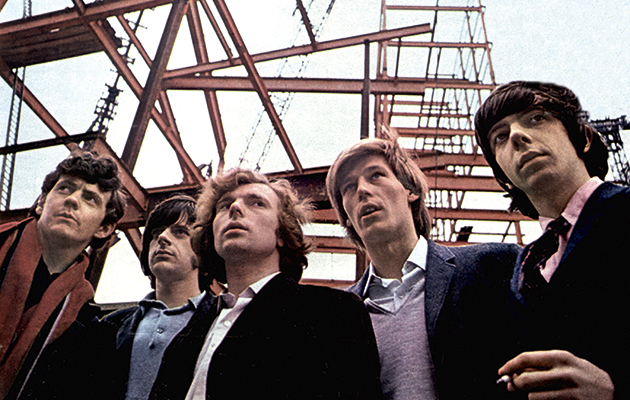Like Liverpool on the other side of the Irish Sea, the port city of Belfast served as a gateway for American music – and local kids couldn’t get enough of the blues and R’n’B records that had made the voyage across the North Atlantic. That the teenaged Van Morrison, who had grown up listening to his dad’s Lead Belly, Muddy Waters and Louis Armstrong 78s, obsessively collected and studied this exotic music wasn’t unusual at the time. What set young Van apart from his peers was his innate ability to absorb its primal essence, as if he’d been hearing these sounds in his head all his life.
When, at 18, Morrison assembled a ragtag combo and proceeded to hold court at the Maritime Hotel, many of those who packed the room were American sailors, whose enthusiastic reception validated his initial efforts. Inevitably, these local heroes headed to London in search of a record deal. They signed with Decca, which was doing well with similarly scruffy R’n’B cover band The Rolling Stones. Arranged in chronological order by single release date around the UK versions of The Angry Young Them and Them Again, the first two discs of The Complete Them provide ample proof of the man’s preternatural genius – he had the calling, and he pursued it with a single-minded passion.
Van’s menacing, Howlin’ Wolf-inspired vocal on “Don’t Start Crying Now”, Them’s first single, produced by in-house arranger Art Greenslade, could be mistaken for Safe As Milk-era Captain Beefheart – hardly what you’d expect from an adolescent studio novice. What the kid needed at this point was a mentor, and he got one soon thereafter in the form of R’n’B/pop trailblazer Bert Berns, who’d decided to try his hand in London after The Beatles thrillingly covered his “Twist And Shout”. Just before their first session together, Berns played his newly penned song “Here Comes The Night” for Morrison on an acoustic guitar, and Van, a quick study, brought a combination of Berns’ Brill Building pop filigree and his own brooding intensity to the released version. The third disc of the new collection, which bears the heading “Demos, Sessions & Rarities”, contains the second take of the song, during which Morrison experiments with and at moments playfully exaggerates the New York-derived vocal flourishes he’s just picked up from Berns.
During that same October 1964 session, with studio pros Alan White on drums, Phil Coulter on organ and Jimmy Page on rhythm guitar, they cut Morrison’s howling, incantatory take on the Joe Williams blues standard “Baby Please Don’t Go”, which he’d picked up from John Lee Hooker’s interpretation.
Greenslade was back at the desk when the next classic, “Gloria”, was cut, while Tommy Scott and Phil Solomon, a fellow Belfast native who managed the band, are credited with co-producing the recording of “Mystic Eyes”. It was musical chairs on both sides of the glass through mid-’65, with Scott – who also provided material for the band, some of it written under the pen name M Gillon – the Scott/Solomon combo and Berns alternating as producers, while a revolving cast of hired guns joining Morrison, Them guitarist Billy Harrison and bass player Alan Henderson in the tracking room. As Van complains in his characteristically cranky notes for the set, the whole thing was a real drag, apart from the sessions themselves, which is where he connected the dots as he poured his soul into the microphone, bringing coherence to The Angry Young Them – so much so that virtually any combination of the 23 songs cut between the fall of 1964 and the summer of 1965 would’ve made a credible Them debut album.
With a relatively stable lineup, Scott helming the sessions and Ray Elliott’s sax filling much of the space previously occupied by the organ, Them Again is more of a piece than its predecessor, though it lacks the ecstatic heights of “Gloria” and “Mystic Eyes”. The 15 tracks alternate between competent if not quite inspired covers of American R’n’B tunes and formally accurate originals in the same mode, with a detour into Animals turf on Scott’s anthemic “Call My Name”. As Morrison tells it, three of the songs were intended for a solo project but subsequently placed on the LP by Scott. He had good reason to do so: Van’s “Could You, Would You” smolders with soulfulness, and his “My Lonely Sad Eyes” jangles moodily, while Scott and Coulter’s “I Can Only Give You Everything” is a snarling proto-garage rocker.
The producer’s unilateral move exemplifies the push/pull that was going on at the time between the increasingly restless Morrison and his handlers. At 22, he was beginning to shape his own style, which he called “folk soul”. He broke it out in his revelatory inhabitation of Dylan’s “It’s All Over Now, Baby Blue”, which connects the dots between these two visionaries, and his own gossamer “Friday’s Child”, a post-Them Again single side, which provides a tantalizing glimpse of what would become Morrison’s signature style.
After three years of honing his chops with countless iterations of Them, the 22-year-old Morrison had had enough. He got out of his deal with Decca and signed with Berns’ Bang label before venturing into the slipstream. This 69-song bounty of artefacts remains, the fervent first book in the Gospel of Van.
Uncut: the spiritual home of great rock music.



